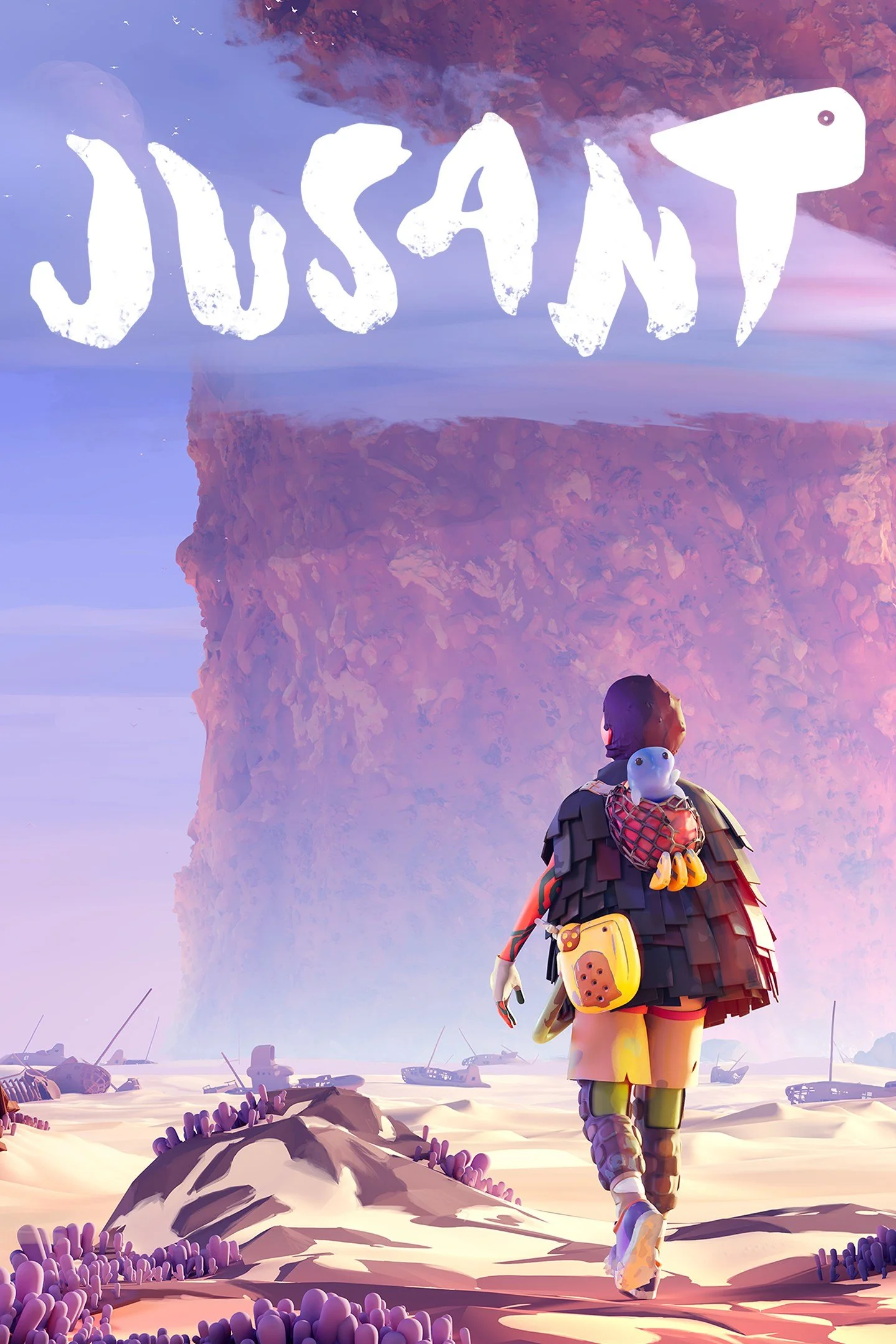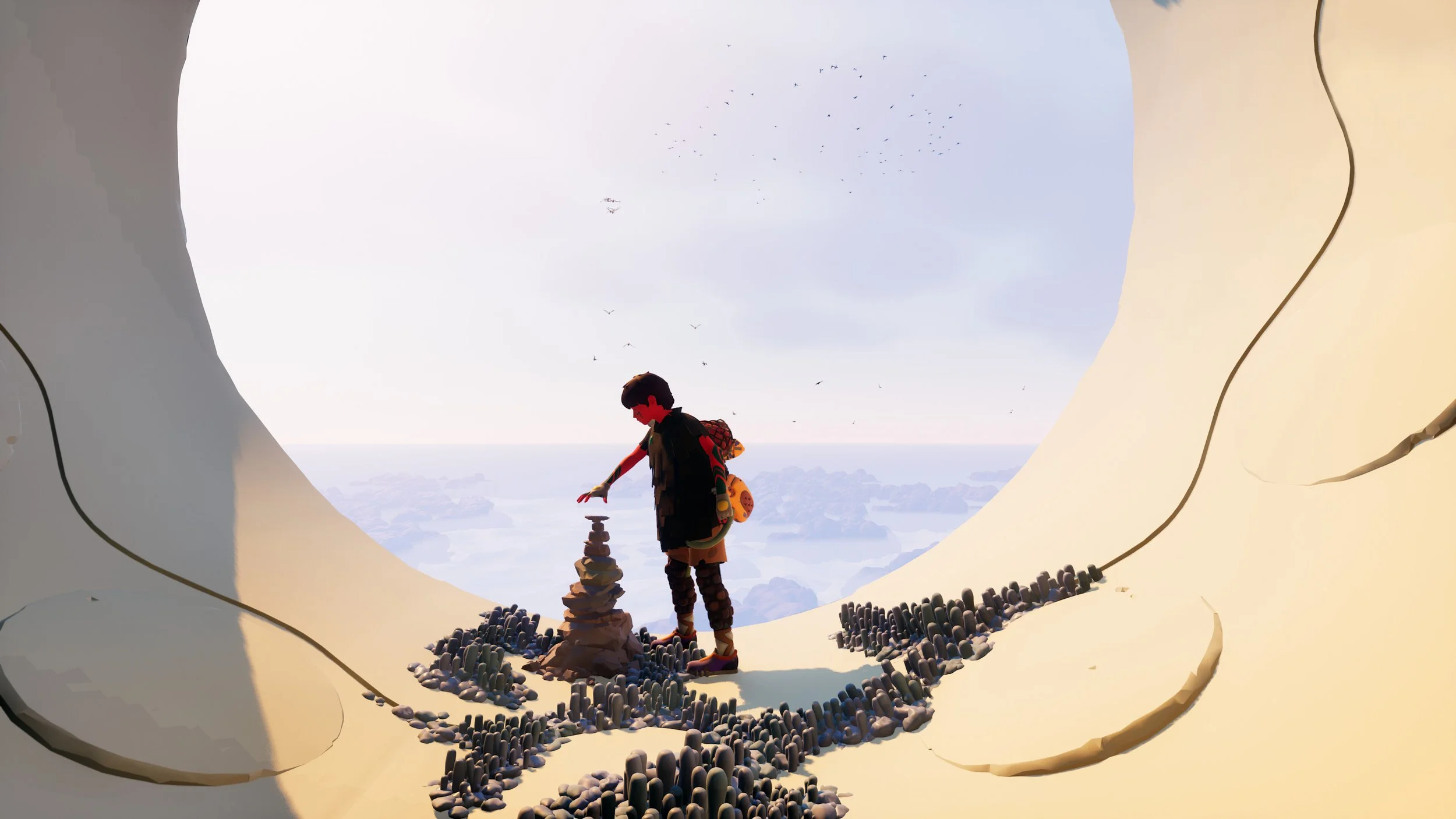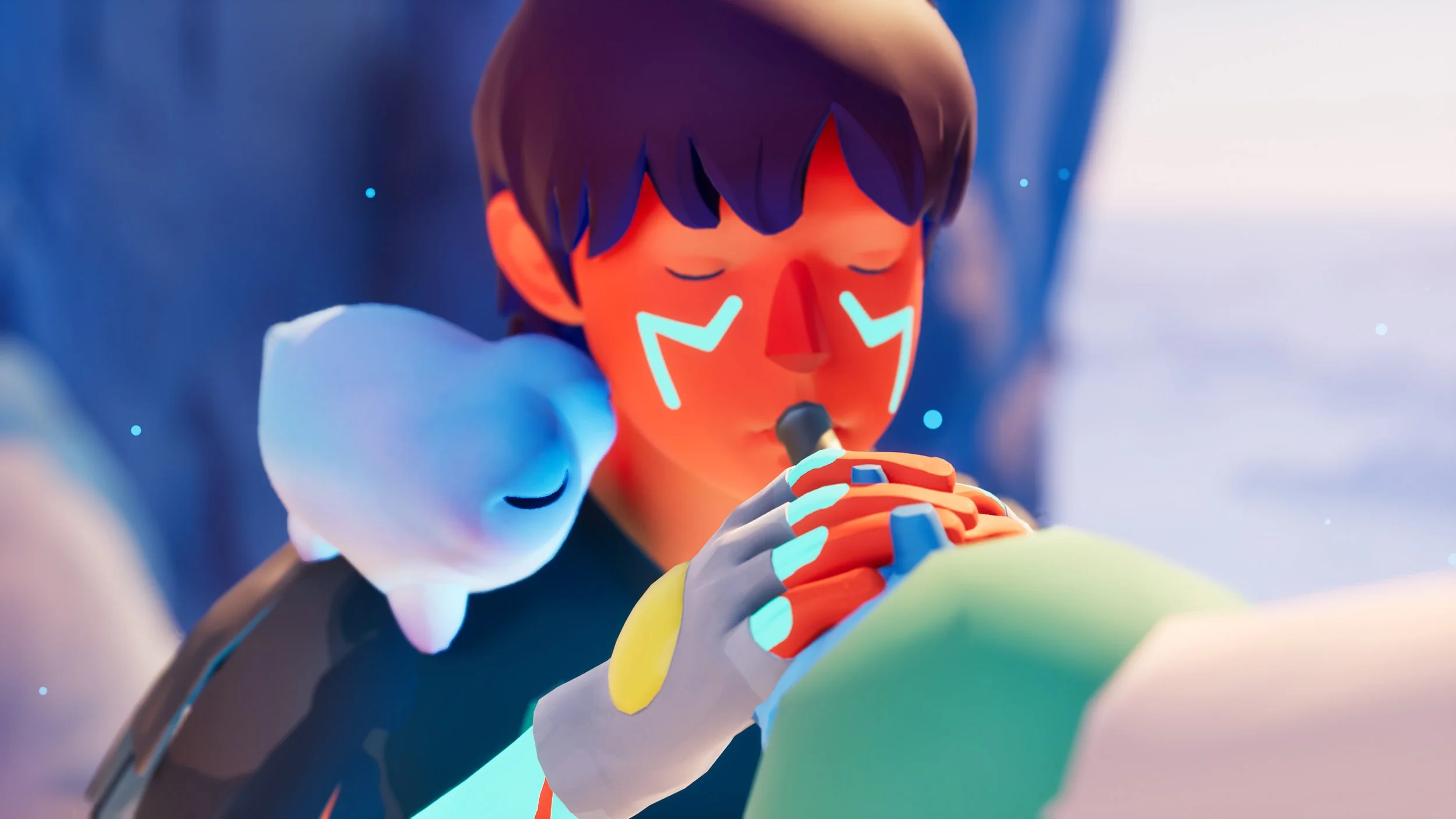JUSANT
From indie developer Don't Nod Games, comes Jusant, a third-person puzzle platformer that asks us to consider our past in order to save our future. It tells a heartening tale of community and perseverance in the face of turmoil, while also attempting to change the way we approach climbing in video games. Using a gentle pace and a more deliberate control scheme, this casual game allows players to appreciate their own progress. It finds serenity in the ascent, pushing us towards the summit of its massive mountainside. Though a few bugs can interrupt the calm vibes, and the exploration is more linear than it lets on, Jusant’s story and gameplay innovations are sure to entice gamers of all levels.
The game opens on a desert flooded with old boats, roaming seagulls, and rusted anchors decaying in the sand. A nameless wanderer treks across the planes alone with a mysterious item in their backpack. As they get farther across the wasteland, they come to the foot of a giant cliff face called The Tower and begin to climb. Jusant doesn’t need to rely on dialogue or a narrator here. Instead, it chooses to be thoughtful about the picture it paints and lets players infer the story from there. This place has changed drastically. As players start to climb, it’s evident that this entire landscape used to be underwater, even the mountain itself. What happened here? How did an entire ocean disappear? Are we here to fix it? How are we supposed to do that? Jusant will have you asking all the right questions as its trail of narrative morsels pulls you deeper into its lore.
Letters and journal entries are littered throughout the mountain side. This is the primary means of unlocking Jusant’s story. These snippets tell of how this society lost its memory. Now, memory loss is a story trope often seen in games and science fiction, however, so rarely is it used in such a grounded manner. It wasn’t some evil menace or a Jacob’s Ladder-inspired nightmare, it was simply over time through a generational amnesia. As elders have died off, vital information has slipped through the cracks and disappeared entirely. In the beginning, everyone lived in relative peace and harmony as water was abundant and free. The ocean stretched for miles and was as deep as the Tower is tall. Then, one day, the ocean started to recede. It got shallower and shallower until it was gone, and no one knew how to bring it back.
Jusant actually manages to maintain its casual tone here. Many of the letters and journal entries lean more into hope than despair. As catastrophic as these changes were, you’ll end up reading more about how this society stuck together and survived their changing world: love stories, family ties, and community bonds are the memories that stick out above all. Through them runs a persistent message of hope and dedication. How can we survive if we don’t take care of each other? And in that, lies the sadness of not noticing sooner that things were changing. It is a mournful yet heartening story, one which you’ll have time to ruminate on, as Jusant’s actual gameplay focuses on pace and patience.
Outside of piecing together The Tower’s history, players will spend a majority of their time climbing The Tower itself, but this isn’t the Assassin’s Creed-inspired parkour that we’re used to. Rather than free soloing an entire building with the press of a single button, Jusant asks players to learn how to grab stones and ledges one hand hold at a time. This is a big change, one that could either innovate on pre-existing models or become an impediment that falls short of our current standards. Change can be great, but is it worth changing something solely for the sake of changing it? Though a bit jarring at first, in practice, the system is effective and fulfilling.
Left trigger to grab with your left hand, right trigger to grab with your right hand, and use the left stick to direct which way you want to grab. The difference was palpable, having to think about each move, which angles to reach for and how to do it. It took time to get used to this new take on an old mechanic, but it was worth it. And that’s exactly what Jusant is asking of you; take your time. This game is not about sprinting up a mountain side. It wants every move to feel intentional. This ultimately adds depth to climbing rather than it being a chore. Once you get the hang of this new muscle memory, you can glide through most early climbs, and there is always a gentle sigh of relief and accomplishment upon reaching your goal. And, since the climbing mechanic keeps players so involved, the rest of the game doesn’t actually have to be that hard.
Jusant aptly leans into accessibility. It helps players protect their progress by letting them set their own checkpoints using pitons. These rope attachments can be hammered into any surface in the game, letting you control where and how far you fall. Whether wandering through an abandoned cliff side village or scaling a looming lighthouse, players have up to four extra pitons they can clip into. So, if there’s a jump or a handhold you’re afraid of missing, just slam in a new piton. If you fall, you’ll reset right back to where you were and you can try again. This seems like it would make the game too easy, but the outcome is a perfect balance of effort and reward. Less rewarding, however, is the use of invisible walls.
When you’re not clipped in and climbing, there are invisible walls everywhere. While this does help prevent accidental falls, it can severely limit the game's exploration. Because of these boundaries, Jusant has players trekking paths that don’t branch. Making it more similar to a standard 2D platformer, like an early Mario game, than the 3D platforming adventure it’s supposed to be. While the game does eventually allow you to approach these singular trails with multiple strategies, as each chapter has a special ability that changes the mold of each level, these don’t drastically alter your approach. You’re still headed in one direction…up. There are some hidden collectibles that can be found as you discover new plateaus, but there are virtually no hidden plateaus. You only reach the traversable areas that are already in your linear path. Meanwhile, you can look out at vast expanses of mountainside that feel as if they should be able to be explored. Thankfully, beyond wanting more mountain to climb, there isn’t much to fault the game over.
There are some small bugs that might hinder your progress every now and again. It’s nothing game-breaking, but they’re hard to miss. Most notably, the nameless wanderer gets a little confused when crossing their left hand over their right hand and vice versa, despite using the proper button inputs. This leads to some momentary frustration, but never stalls progress for long. There is also one detail conspicuously missing from its story. Who are we, really?
Spoiler alert: the game never tells you. There is mention of a legendary piper in some of the game's letters, but we never find out our name, where we came from, or how we came in contact with the mysterious alien we’re carrying in our backpack. Oh, did I not mention the alien? The inexplicably cute animal sidekick? Well, neither does the game. While you eventually uncover more background on what your alien companion is, there is still nothing about why we’re here and why now. Ultimately, this took away from some of the final chapter’s impact, but for the most part, you’ll still feel a sense of accomplishment upon completing the story.
Jusant does such an excellent job of letting players empathize with its long-gone society, that it’s okay if we never get an answer to who we are. This also leaves the door open for a potential prequel game that could be entirely unrelated in gameplay. Something in the vein of Ico, Shadow of The Colossus, and The Last Guardian. Maybe, this could take place during a time when the ocean started to disappear, or before it happened at all? These potential paths have me anxious for the next entry in the series, if there will ever be one.
Don’t Nod Games newest franchise is the perfect place for casual gamers to dip their feet. Its uplifting tale of survival and strife will have you combing its surface for more details. While its innovation on how to climb will work your brain just enough without overwhelming new players or alienating veterans, Jusant provides a fresh and satisfying way to scale unimaginable heights. Though its linear nature and occasional buggy hiccups can’t be ignored, that shouldn’t keep players away from reaching to the top of this literal up-hill battle.
VERDICT: Play This Game




